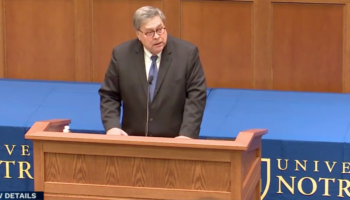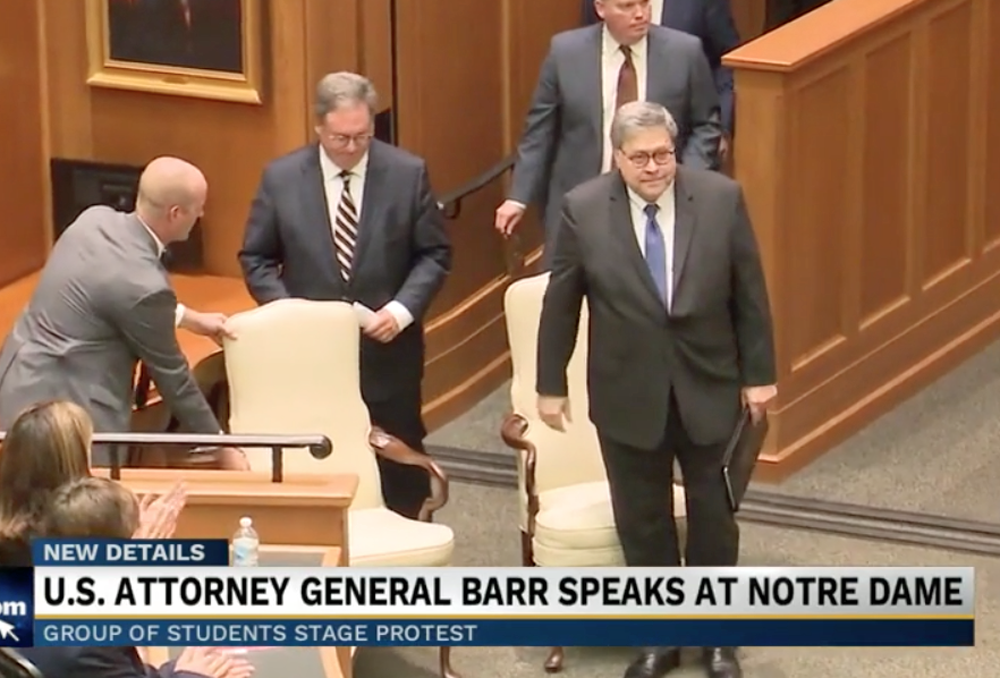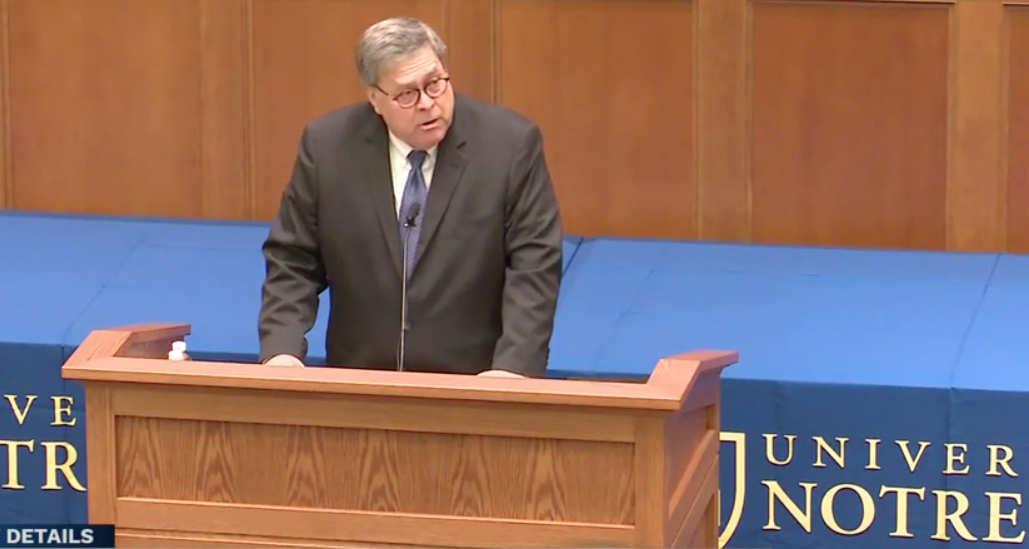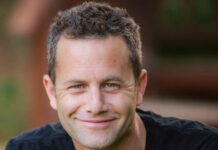The following is the full transcript of the speech Attorney General William P. Barr delivered

to the Law School and the de Nicola Center for Ethics and Culture at the University of Notre Dame, South Bend, Indiana, Friday, October 11, 2019
Thank you, Tom, for you kind introduction. Bill and Roger, it’s great to be with you.
Thank you to the Notre Dame Law School and the de Nicola Center for Ethics and Culture for graciously extending an invitation to address you today. I’d also like to express gratitude to Tony de Nicola, whose generous support has shaped – and continues to shape – countless minds through examination of the Catholic moral and intellectual tradition.
Today, I would like to share some thoughts with you about religious liberty in America. It’s an important priority in this Administration and for this Department of Justice.
We have set up a task force within the Department in which different components that have equities in this area including the Solicitor General’s Office, the Civil Division, the Office of Legal Counsel, and other offices. We have regular meetings. We keep an eye out for cases or events around the country where states are misapplying the Establishment Clause in a way that discriminates against people of faith, or cases where states adopt laws that impinge upon the free exercise of religion.
From the Founding Era onward, there was strong consensus about the centrality of religious liberty in the United States.

The imperative of protecting religious freedom was not just a nod in the direction of piety. It reflects the Framers’ belief that religion was indispensable to sustaining our free system of government.
In his renowned 1785 pamphlet, “Memorial and Remonstrance Against Religious Assessments,” James Madison described religious liberty as “a right towards men” but “a duty towards the Creator,” and a “duty….precedent both in order of time and degree of obligation, to the claims of Civil Society.”
It has been over 230 years since that small group of colonial lawyers led a Revolution and launched what they viewed as a great experiment, establishing a society fundamentally different than those that had gone before.
They crafted a magnificent Charter of Freedom – the United States Constitution – which provides for limited government, while leaving “the People” broadly at liberty to pursue our lives both as individuals and through free associations.
This quantum leap in liberty has been the mainspring of unprecedented human progress, not only for Americans, but for people around the world.
In the 20th century, our form of free society faced a severe test.
There had always been the question whether a democracy so solicitous of individual freedom could stand up against a regimented totalitarian state.
That question was answered with a resounding “yes” as the United States stood up against and defeated, first fascism, and then communism.
But in the 21st century, we face an entirely different kind of challenge.
The challenge we face is precisely what the Founding Fathers foresaw would be our supreme test as a free society.
They never thought the main danger to the Republic came from external foes. The central question was whether, over the long haul, we could handle freedom. The question was whether the citizens in such a free society could maintain the moral discipline and virtue necessary for the survival of free institutions.
By and large, the Founding generation’s view of human nature was drawn from the Classical Christian tradition.
These practical Statesmen understood that individuals, while having the potential for great good, also had the capacity for great evil.
Men are subject to powerful passions and appetites, and, if unrestrained, are capable of ruthlessly riding roughshod over their neighbors and the community at large.
No society can exist without some means for restraining individual rapacity.
But, if you rely on the coercive power of government to impose restraints, this will inevitably lead to a government that is too controlling, and you will end up with no liberty, just tyranny.

On the other hand, unless you have some effective restraint, you end up with something equally dangerous – licentiousness – the unbridled pursuit of personal appetites at the expense of the common good. This is just another form of tyranny – where the individual is enslaved by his appetites, and the possibility of any healthy community life crumbles.
Edmund Burke summed up this point in his typically colorful language:
“Men are qualified for civil liberty, in exact proportion to their disposition to put chains upon their appetites….Society cannot exits unless a controlling power be placed somewhere; and the less of it there is within, the more there must be without. It is ordained in the eternal constitution of things that men’s intemperate minds cannot be free. Their passions forge their fetters.”
So the Founders decided to take a gamble. They called it a great experiment.
They would leave “the People” broad liberty, limit the coercive power of the government, and place their trust in self-discipline and virtue of the American people.
In the words of Madison, “We have staked our future on the ability of each of us to govern ourselves…”
This is really what was meant by “self-government.” It did not mean primarily the mechanics by which we select a representative legislative body. It referred to the capacity of each individual to restrain and govern themselves.
But what was the source of this internal controlling power? In a free Republic those restraints could not be handed down from above by philosopher kings.
Instead, social order must flow up from the people themselves – freely obeying the dictates of inwardly-possessed and commonly-shared moral values. And to control willful human beings, with an infinite capacity to rationalize, those moral values must rest on authority independent of men’s will – they must flow from a transcendent Supreme Being.
In short, in the Framers’ view, free government was only suitable and sustainable for a religious people – a people who recognized that there was a transcendent moral order antecedent to both the state and manmade law and who had the discipline to control themselves according to those enduring principles.
As John Adams put it: “We have no government armed with the power which is capable of contending with human passions unbridled by morality and religion. Our Constitution was made only for a moral and religious people. It is wholly inadequate for the government of any other.”
As Father John Courtney Murray observed, the American tenet was not that:
“Free government is inevitable, only that it is possible, and that its possibility can be realized only when the people as a whole are inwardly governed by the recognized imperatives of the universal moral order.”
How does religion promote the moral discipline and virtue needed to support free government?
First, it gives us the right rules to live by. The Founding generation were Christians. They believed that the Judeo-Christian moral system corresponds to the true nature of man. Those moral precepts start with the Two Great Commandments – to Love God with your whole heart, soul and mind; and to Love Thy Neighbor as Thyself.
But they also include the guidance of Natural Law – a real, transcendent moral order which flows from God’s eternal law – the Divine wisdom by which the whole Creation is ordered. The eternal law is impressed upon, and reflected in, all created things.
From the nature of things we can, through reason, experience, discern standards of right and wrong that exist independent of human will.
Modern secularists dismiss this idea of morality as other worldly-superstition imposed by a kill-joy clergy. In fact, Judeo-Christian moral standards are the ultimate utilitarian rules for human conduct.
They reflect the rules that are best for man, not in the by and by, but in the here and now. They are like God’s instruction manual for the best running of man and human society.
By the same token, violations of these moral laws have bad, real-world consequences for man and society. We many not pay the price immediately, but over time the harm is real.
Religion helps promote moral discipline within society. Because man is fallen, we don’t automatically conform ourselves to moral rules even when we know they are good for us.
But religion helps teach, train, and habituate people to want what is good. It does not do this primarily by formal laws – that is, through coercion. It does this through moral education and by informing society’s informal rules – its customs and traditions which reflect the wisdom and experience of the ages.
In other words, religion helps frame moral culture within society that instills and reinforces moral discipline.
I think we all recognize that over the past 50 years religion has been under increasing attack.
On the one hand, we have seen the steady erosion of our traditional Judeo-Christian moral system and a comprehensive effort to drive it from the public square.
On the other hand, we see the growing ascendancy of secularism and the doctrine of moral relativism.
By any honest assessment, the consequences of this moral upheaval have been grim.
Virtually every measure of social pathology continues to gain ground.
In 1965, the illegitimacy rate was eight percent. In 1992, when I was last Attorney General, it was 25 percent. Today it is over 40 percent. In many of our large urban areas, it is around 70 percent.
Along with the wreckage of the family, we are see record levels of depression and mental illness, dispirited young people, soaring suicide rates, increasing numbers of angry and alienated young males, an increase in senseless violence, and a deadly drug epidemic.
As you all know, over 70,000 people die a year from drug overdoses. That is more causalities in a year than we experienced during the entire Vietnam War.
I will not dwell on all the bitter results of new secular age. Suffice it to say that the campaign to destroy the traditional moral order has brought with it immense suffering, wreckage, and misery. And yet, the forces of secularism, ignoring these tragic results, press on with even greater militancy.
Among these militant secularists are many so-called “progressives.” But where is the progress?
We are told we are living in a post-Christian era. But what has replaced the Judeo-Christian moral system? What is it that can fill the spiritual void in the hearts of the individual person? And, what is a system of values that can sustain human social life?
The fact is that no secular creed has emerged capable of performing the role of religion.
Scholarship suggests that religion has been integral to the development and thriving of homo sapiens since we emerged roughly 50,000 years ago. It is just for the past few hundred years we have experimented in living without religion.
We hear much today about our humane values. But, in the final analysis, what undergirds these values? What commands our adherence to them?
What we call values today is really nothing more than mere sentimentality, still drawing on the vapor trails of Christianity.
Now, there have been times and places where the traditional moral order has been shaken.
In the past, societies – like the human body – seem to have a self-healing mechanism – a self-correcting mechanism that gets things back on course if things go too far.
The consequences of moral chaos become too pressing. The opinion of decent people rebels. They coalesce and rally against obvious excess. Periods of moral entrenchment follow periods of excess.
This is the idea of the pendulum. We have all thought that after a while the “pendulum will swing back.”
But today we face something different that may mean that we cannot count on the pendulum swinging back.
First is the force, fervor, and comprehensiveness of the assault on religion we are experiencing today. This is not decay; it is organized destruction. Secularists, and their allies among the “progressives,” have marshaled all the force of mass communications, popular culture, the entertainment industry, and academia in an unremitting assault on religion and traditional values.
These instruments are used not only to affirmatively promote secular orthodoxy, but also drown out and silence opposing voices, and to attack viciously and hold up to ridicule any dissenters.
One of the ironies, as some have observed, is that the secular project has itself become a religion, pursued with religious fervor. It is taking on all the trappings of a religion – including inquisitions and excommunication.
Those who defy the creed risk a figurative burning at the stake – social, educational, and professional ostracism and exclusion waged through lawsuits and savage social-media campaigns.
The pervasiveness and power of our high-tech popular culture fuels apostasy in another way. It provides an unprecedented degree of distraction.
Part of the human condition is that there are big questions that should stare us in the face. Are we created or are we purely material accidents? Does our life have any meaning or purpose? But, as Blaise Pascal observed, instead of grappling with these questions, humans can be easily distracted from thinking about the “final things.”
Indeed, we now live in the age of distraction where we can envelop ourselves in a world of digital stimulation and universal connectivity. And we have almost limitless ways of indulging all our physical appetites.
There is another modern phenomenon that suppresses society’s self-corrective mechanisms – that make it harder for society to restore itself.
In the past, when societies are threatened by moral chaos, the overall social costs of licentiousness and irresponsible personal conduct becomes so high that society ultimately recoils and reevaluates the path they are on.
But today – in the face of all the increasing pathologies – instead of addressing the underlying cause, we have the State in the role of Alleviator of Bad Consequences. We call on the State to mitigate the social costs of personal misconduct and irresponsibility.
So the reaction to growing illegitimacy is not sexual responsibility, but abortion.
The reaction to drug addiction is safe injection sites.
The solution to the breakdown of the family is for the State to set itself up as the ersatz husband for single mothers and the ersatz father to their children.
The call comes for more and more social programs to deal with the wreckage. While we think we are solving problems, we are underwriting them.
We start with an untrammeled freedom and we end up as dependents of a coercive state on whom we depend.
Interestingly, this idea of the State as the alleviator of bad consequences has given rise to a new moral system that goes hand-in-hand with the secularization of society. It can be called the system of “macro-morality.” It is in some ways an inversion of Christian morality.
Christianity teaches a micro-morality. We transform the world by focusing on our own personal morality and transformation.
The new secular religion teaches macro-morality. One’s morality is not gauged by their private conduct, but rather on their commitment to political causes and collective action to address social problems.
This system allows us to not worry so much about the strictures on our private lives, while we find salvation on the picket line. We can signal our finely tuned moral sensibilities by demonstrating for this cause or that.
Something happened recently that crystalized the difference between these moral systems. I was attending Mass at parish I did not usually go to in Washington, D.C. At the end of Mass, the Chairman of the Social Justice Committee got up to give his report to the parish. He pointed to the growing homeless problem in D.C. and explained that more mobile soup kitchens were needed to feed them. This being a Catholic church I expected him to call for volunteers to go out and provide this need. Instead, he recounted all the visits that the Committee had made to the D.C. government to lobby for higher taxes and more spending to fund mobile soup kitchens.
A third phenomenon which makes it difficult for the pendulum to swing back is the way law is being used as a battering ram to break down traditional moral values and to establish moral relativism as a new orthodoxy.
Law is being used as weapon in a couple of ways.
First, either through legislation but more frequently through judicial interpretation, secularists have been continually seeking to eliminate laws that reflect traditional moral norms.
At first, this involved rolling back laws that prohibited certain kinds of conduct. Thus, the watershed decision legalizing abortion. And since then, the legalization of euthanasia. The list goes on.
More recently, we have seen the law used aggressively to force religious people and entities to subscribe to practices and policies that are antithetical to their faith.
The problem is not that religion is being forced on others. The problem is that irreligion and secular values are being forced on people of faith.
This reminds me of how some Roman emperors could not leave their loyal Christian subjects in peace but would mandate that they violate their conscience by offering religious sacrifice to the Emperor as a God.
Similarly, militant secularists today do not have a live and let live spirit — they are not content to leave religious people alone to practice their faith. Instead they seem to take a delight in compelling people to violate their conscience.
For example, the last Administration sought to force religious employers, including Catholic religious orders, to violate their sincerely held religious views by funding contraceptive and abortifacient coverage in their health plans. Similarly, California has sought to require pro-life pregnancy centers to provide notices of abortion rights.
This refusal to accommodate the free exercise of religion is relatively recent. Just 25 years ago, there was broad consensus in our society that our laws should accommodate religious belief.
In 1993 Congress passed the Religious Freedom Restoration Act – RFRA. The purpose of the statute was to promote maximum accommodation to religion when the government adopted broad policies that could impinge on religious practice.
At the time, RFRA was not controversial: it was introduced by Chuck Schumer with 170 cosponsors in the House, and was introduced by Ted Kennedy and Orrin Hatch with 59 additional cosponsors in the Senate. It passed by voice vote in the House and by a vote of 97-3 in the Senate.
Recently, as the process of secularization has accelerated, RFRA has come under assault, and the idea of religious accommodation has fallen out of favor.
Because this Administration firmly supports accommodation of religion, the battleground has shifted to the states. Some state governments are now attempting to compel religious individuals and entities to subscribe to practices, or to espouse viewpoints, that are incompatible with their religion.
Ground zero for these attacks on religion are the schools. To me, this is the most serious challenge to religious liberty.
For anyone who has a religious faith, by far the most important part of exercising that faith is the teaching of that religion to our children. The passing on of the faith. There is no greater gift we can give our children and no greater expression of love.
For the government to interfere in that process is a monstrous invasion of religious liberty.
Yet here is where the battle is being joined, and I see the secularists are attacking on three fronts.
The first front relates to the content of public school curriculum. Many states are adopting curriculum that is incompatible with traditional religious principles according to which parents are attempting to raise their children. They often do so without any opt out for religious families.
Thus, for example, New Jersey, recently passed a law requiring public schools to adopt an LGBT curriculum that many feel is inconsistent with traditional Christian teaching. Similar laws have been passed in California and Illinois.
And the Orange County Board of Education in California issued an opinion that “parents who disagree with the instructional materials related to gender, gender identity, gender expression and sexual orientation may not excuse their children from this instruction.”
Indeed, in some cases, the schools may not even warn parents about lessons they plan to teach on controversial subjects relating to sexual behavior and relationships.
This puts parents who dissent from the secular orthodoxy to a difficult choice: Try to scrape together the money for private school or home schooling, or allow their children to be inculcated with messages that they fundamentally reject.
A second axis of attack in the realm of education are state policies designed to starve religious schools of generally available funds and encouraging students to choose secular options. Montana, for example, created a program that provided tax credits to those who donated to a scholarship program that underprivileged students could use to attend private school. The point of the program was to provide greater parental and student choice in education and to provide better educations to needy youth.
But Montana expressly excluded religiously-affiliated private schools from the program. And when that exclusion was challenged in court by parents who wanted to use the scholarships to attend a nondenominational Christian school, the Montana Supreme Court required the State to eliminate the program rather than allow parents to use scholarships for religious schools.
It justified this action by pointing to a provision in Montana’s State Constitution commonly referred to as a “Blaine Amendment.” Blaine Amendments were passed at a time of rampant anti-Catholic animus in this country, and typically disqualify religious institutions from receiving any direct or indirect payments from a State’s funds.
The case is now in the Supreme Court, and we filed a brief explaining why Montana’s Blaine Amendment violates the First Amendment.
A third kind of assault on religious freedom in education have been recent efforts to use state laws to force religious schools to adhere to secular orthodoxy. For example, right here in Indiana, a teacher sued the Catholic Archbishop of Indianapolis for directing the Catholic schools within his diocese that they could not employ teachers in same-sex marriages because the example of those same-sex marriages would undermine the schools’ teaching on the Catholic view of marriage and complementarity between the sexes.
This lawsuit clearly infringes the First Amendment rights of the Archdiocese, by interfering both with its expressive association and with its church autonomy. The Department of Justice filed a statement of interest in the state court making these points, and we hope that the state court will soon dismiss the case.
Taken together, these cases paint a disturbing picture. We see the state requiring local public schools to insert themselves into contentious social debates, without regard for the religious views of their students or parents. In effect, these states are requiring local communities to make their public schools inhospitable to families with traditional religious values; those families are implicitly told that they should conform or leave.
At the same time, pressure is placed on religious schools to abandon their religious convictions. Simply because of their religious character, they are starved of funds – students who would otherwise choose to attend them are told they may only receive scholarships if they turn their sights elsewhere.
Simultaneously, they are threatened in tort – and, eventually, will undoubtedly be threatened with denial of accreditation – if they adhere to their religious character. If these measures are successful, those with religious convictions will become still more marginalized.
I do not mean to suggest that there is no hope for moral renewal in our country.
But we cannot sit back and just hope the pendulum is going to swing back toward sanity.
As Catholics, we are committed to the Judeo-Christian values that have made this country great.
And we know that the first thing we have to do to promote renewal is to ensure that we are putting our principles into practice in our own personal private lives.
We understand that only by transforming ourselves can we transform the world beyond ourselves.
This is tough work. It is hard to resist the constant seductions of our contemporary society. This is where we need grace, prayer, and the help of our church.
Beyond this, we must place greater emphasis on the moral education of our children.
Education is not vocational training. It is leading our children to the recognition that there is truth and helping them develop the facilities to discern and love the truth and the discipline to live by it.
We cannot have a moral renaissance unless we succeed in passing to the next generation our faith and values in full vigor.
The times are hostile to this. Public agencies – including public schools – are becoming secularized and increasingly are actively promoting moral relativism.
If ever there was a need for a resurgence of Catholic education – and more generally religiously affiliated schools – it is today.
I think we should do all we can to promote and support authentic Catholic education at all levels.
Finally, as lawyers, we should be particularly active in the struggle that is being waged against religion on the legal plane.
We must be vigilant to resist efforts by the forces of secularization to drive religious viewpoints from the public square and to impinge upon the free exercise of our faith.
I can assure you that, as long as I am Attorney General, the Department of Justice will be at the forefront of this effort– ready to fight for the most cherished of our liberties – the freedom to live according to our faith.
Thank you for the opportunity to talk with you today. And God bless you and Notre Dame.
(Note: bold areas added by God Reports)




Thank God for learned men,like Mr. Barr, who trust in Jesus.
Grateful for lawyers who will make a stand for religious liberty. We know that governmental protection for Christians will not be for much longer. It will be most important to teach our children as Christians who will face persecution. It is important to pray for those deceived secularists. However we know Christ will be victorious and do not need to fear what is happening But just be prepared.
Comments are closed.